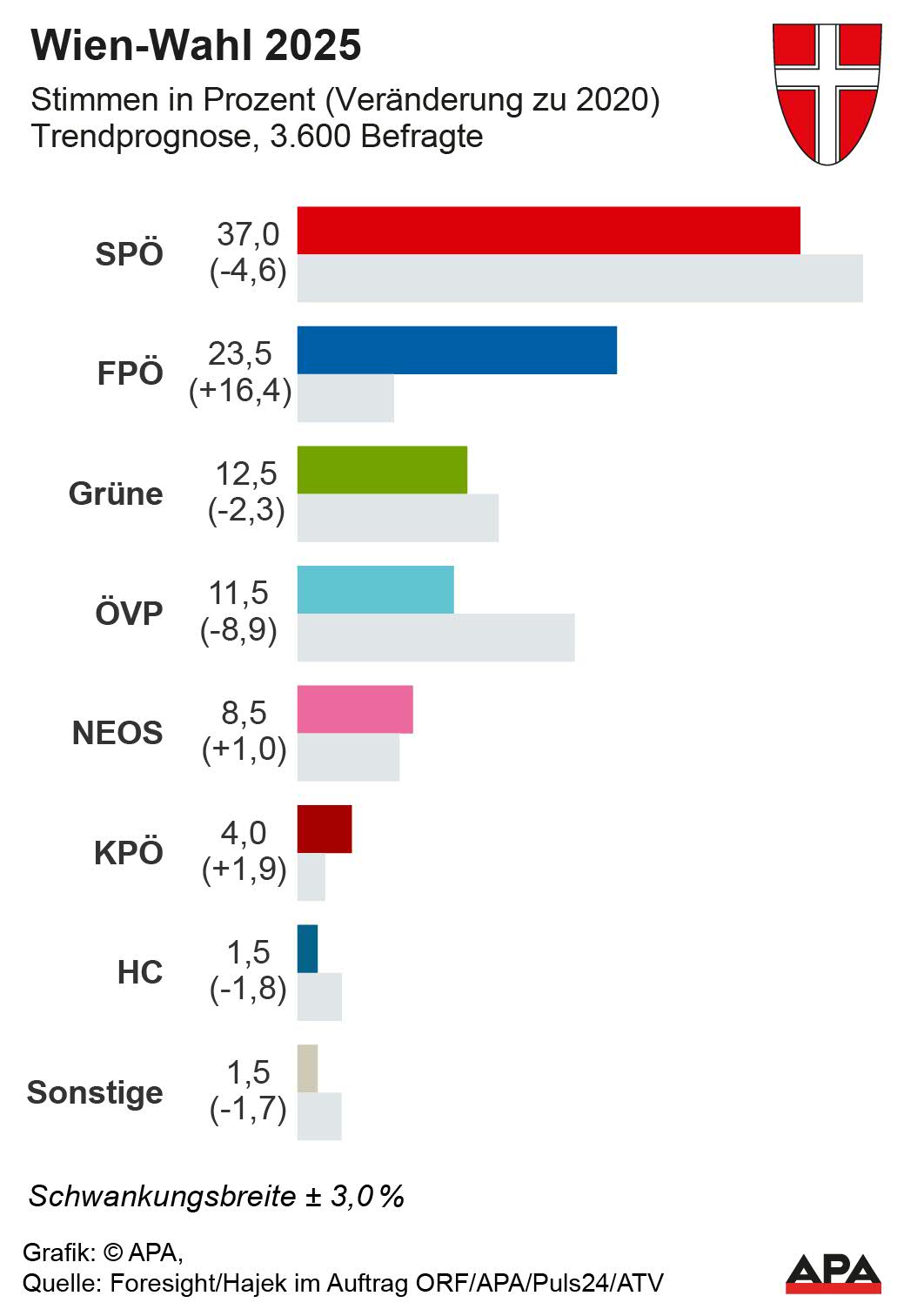First Projection and Forecast for the Vienna Election 2025

The SPÖ clearly defended the first place in the Vienna election on Sunday according to the first projection by the Foresight Institute for APA and ORF, with slight losses.
First Projection for the Vienna Election 2025
According to the calculation at 6:45 PM, the SPÖ is likely to receive 39.3 percent of the votes, a decrease of 2.3 percentage points. The FPÖ takes second place (20.5 percent), with the Blues nearly tripling their share of the vote. Behind them are the Greens (14.7), followed closely by ÖVP and NEOS with 9.6 percent each.
According to this projection (counting level 13.4 percent), the KPÖ with 4.2 percent and the Team Strache (1.1 percent) are likely to have failed. Thus, both lists would miss the five-percent hurdle and therefore entry into the municipal council.
The projection has a margin of fluctuation of +/-1.8 percentage points. Therefore, the KPÖ might still surpass the five-percent hurdle.
First Trend Forecast for the Vienna Election at 5:00 PM
The SPÖ clearly secured first place in the Vienna election on Sunday according to an initial trend forecast at 5:00 PM by Foresight/Hajek on behalf of ORF/APA/Puls24/ATV, despite losses. According to this survey-based estimate, the SPÖ is expected to receive about 37 percent of the votes.
Accordingly, the FPÖ takes second place with 23.5 percent, ahead of the Greens with 12.5 percent. The ÖVP plummets to 11.5 percent but is still ahead of the NEOS, who reach 8.5 percent. According to the initial trend forecast, KPÖ/Links (4 percent) and the Team HC Strache (1.5 percent) are unlikely to enter the Vienna City Council.

A coalition of SPÖ and NEOS would not have a majority of mandates according to this forecast. However, cooperation between SPÖ and ÖVP as well as between SPÖ and Greens would be feasible. The SPÖ comes to 40 of the 100 mandates (-6), the FPÖ to 25 (+17), the Greens to 13 (-3), as well as the ÖVP (-9). The NEOS gain one mandate and thus hold nine mandates. Accordingly, the previous coalition of SPÖ and NEOS would only come to 49 seats.
The trend forecast is created by the election researchers of Foresight and Peter Hajek. The experts conduct surveys independently and create a joint forecast on election Sunday, which is published by ORF, APA, and Puls 24. This will provide an estimate of the election result in percentage as well as for the distribution of mandates. Figures are available for all seven parties running city-wide in Vienna (SPÖ, ÖVP, Greens, NEOS, FPÖ, KPÖ, HC). In total, approximately 3,600 interviews with eligible voters in Vienna are conducted for the trend forecast - about 2,000 online and 1,600 by phone. The trend forecast will have a margin of fluctuation of a maximum of +/-3.0 percentage points.
OGM Projection with Similar Result
The projection by the opinion research institute OGM for Servus Nachrichten is almost identical. Accordingly, the SPÖ can clearly defend first place with 39.1 percent. The FPÖ regains second place after the 2020 slump and can almost triple with 20.4 percent. In third place, with a slight minus and 14.6 percent, are the Greens, followed by the NEOS with 10.2 percent. The ÖVP's decline is massive, now at only 9.5 percent. The Team Strache with 1.1 percent and the alliance of KPÖ and Links with 4.0 percent do not make it into the town hall.
(APA/Red)
This article has been automatically translated, read the original article here.





